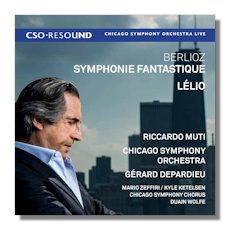
The Internet's Premier Classical Music Source
Related Links
- Berlioz Reviews
- Latest Reviews
- More Reviews
-
By Composer
-
Collections
DVD & Blu-ray
Books
Concert Reviews
Articles/Interviews
Software
Audio
Search Amazon
Recommended Links
Site News
 CD Review
CD Review
Hector Berlioz

- Symphonie Fantastique
- Lélio, ou le retour de la vie *
* Mario Zeffiri, tenor
* Kyle Ketelsen, bass-baritone
* Gérard Depardieu, narrator
* Chicago Symphony Chorus/Duain Wolfe
Chicago Symphony Orchestra/Riccardo Muti
Recorded Live at Orchestra Hall, Symphony Center, Chicago - September 23-25 & 28, 2010
CSO Resound CSOR-9011501 2CDs 54:48+59:54
"They inspire him." Such was the simple response when I asked a Chicago Symphony employee about the partnership between conductor and orchestra. Indeed, as the orchestra enters its sixth season under Riccardo Muti, there has been ample evidence that this is the case. This release not only gives us a genuine rarity in Lélio, but also documents the opening concerts of the Muti era in Chicago. This stands in stark contrast to the Boston Symphony Orchestra, which seemingly released the opening concerts of Andris Nelsons tenure as soon as possible. Whatever the reason for the delay, we can look back on these concerts as something special.
Collectors may remember that Muti recorded the Fantastique previously, an exceptional reading with the Philadelphia Orchestra. The orchestra also has a history with the work, although – given the legendary brass section – not as storied as one might expect. This live concert memento preserves both orchestra and conductor in top form. The playing is glorious, aided by fine recorded sound. Muti isn't afraid to let the music's raunchier elements shine, though listeners expecting hysteria and wildness won't be pleased. The conductor truly highlights the score's Classical elements, lending a grace and elegance to the opening trio of movements. Perhaps the vision has mellowed in the near-30 years since Muti set down the work for EMI, but he remains as attuned to the idiom as ever. The playing of the Chicago Symphony may not match their Philadelphia colleagues in sheer lushness, but they are absolutely outstanding in every way. Furthermore, they arguably are an ensemble better-suited to this new approach that Muti chooses.
The opening movements lack the frenzy of a Charles Munch or the color-drenched orgy of a Stokowski, but the Markevitch-like detail and superior playing will certainly suffice. I confess that I don't often pay attention to the second and third movements, but the superlative woodwind playing and atmospheric tension held my interest. With the March to the Scaffold, we enter the real heart of the work, and it is here that I was first disappointed. Exceptional as everything sounds, the Chicago brass are almost too poised here, despite a good clip for marching. I miss some of the coarseness that Solti was famous for. That said, the strings sound wonderful. The contrast between sanity and insanity is brilliantly explored. And the brass do let go at the end, with thrilling effect. The "Witches Sabbath" is hellish and shows Muti really letting go. The brass snarl a little more here. Muti really seems galvanized by the live setting, and the Chicago players respond masterfully. Overall, I prefer the earlier EMI recording by just a hair; the splashier colors and overall whole strike me as more successful. But the final moments here are as enthralling as any, and the audience is amazingly quiet. As a bonus, there is no unnecessary applause at the end. This is a great performance.
Lélio is a very strange work. It's kind of a sequel to the Symphonie, and uses some of the same themes. But in a way it feels like Jaws III, the theme shows up every so often, but the rest feels so foreign that it doesn't matter much. To the work's credit, it's nowhere near as bad as Jaws III. It doesn't really measure up the original either, although as always with Berlioz there are some inventive moments. The use of a narrator is interesting, and the tenor has some truly beautiful, almost art-song like moments. Mario Zeffiri scoops a little here and there as the tenor soloist, but he has a mostly beautiful tone. Kyle Ketelsen does his job as bass-baritone to sound suitably grand and imposing. Narrator Gérard Depardieu is totally involved and apparently moved around quite a bit; this really isn't a problem, even on a recording. The Chicago Symphony Chorus is typically excellent, and the orchestra is great as well, despite not having much to do for long stretches. The booklet provides full texts, which strike me as essential unless you speak fluent French. Really, there isn't much more to say about it. I suppose Jean Martinon on EMI/Warner is slightly more French (was there anyone more French, save perhaps Paul Paray?) Otherwise, if the coupling appeals or you love the Chicago Symphony Orchestra, this is a fascinating look at Berlioz and a terrific souvenir.
Copyright © 2015, Brian Wigman





















